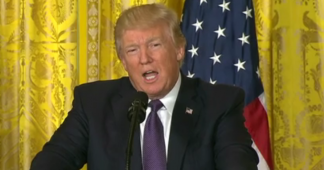Harvard professor and psychoanalyst on the “antiquated” Goldwater rule and our president’s “serious mental illness” VIDEO
The president of the United States is a global celebrity whose every action is endlessly commented upon and dissected for meaning by the news media, foreign powers (both friends and foes alike) and the public.
In the age of television and now the internet, there are hundreds of thousands of hours of video and audio footage of every president widely available. There are also rumors and leaks from within the White House and other branches of government that can help paint a picture of a given president’s moods, desires, thoughts and other behavior. What is to be done if this evidence collectively suggests that the president of the United States is mentally ill?
Unfortunately, with Donald Trump this is not the stuff of a political thriller. It is painfully plausible and all too real. The evidence suggesting that Donald Trump may have serious mental health problems is overwhelming.
He is a compulsive liar who creates his own fantasy world. Trump is also extremely moody and impulsive. Trump’s advisers have to satisfy his extreme narcissism and nurture his detachment from reality by presenting him — on a twice-daily basis — with a file folder full of “good news.” Fellow Republicans have been recorded on a hot mike suggesting that Trump may be “crazy.” The American news media, as well as commentators from other countries, have voiced serious concerns about Trump’s mental health and the threat it poses to global security.
Why are so many psychiatrists and other clinicians afraid to comment about Donald Trump’s mental health? What is the role of the “Goldwater rule” — which holds that mental health professionals should not attempt to diagnose public figures they have not personally treated — in their relative silence? Is Donald Trump suffering from symptoms of mental illness? If so, what type of disorder does he exhibit, and what are the consequences for America and the world?
In an effort to answer these questions, I recently spoke with Dr. Lance Dodes. He is assistant clinical professor of psychiatry at Harvard Medical School (retired) and a training and supervising analyst emeritus at the Boston Psychoanalytic Society and Institute.
Dodes is a signatory to the much-discussed February 2017 open letter to The New York Times that sought to warn the public about the dangers posed by Donald Trump’s mental health. He is also a contributing writer for the new book “The Dangerous Case of Donald Trump: 27 Psychiatrists and Mental Health Experts Assess a President.”
A longer version of this conversation can be heard on my podcast, which is available on Salon’s Featured Audio page.
The concerns about Donald Trump’s mental health are obvious. But how does the so-called Goldwater rule complicate public discussions of Trump’s mental health by psychiatrists and other clinicians?
The Goldwater rule is from the American Psychiatric Association (APA). However, the APA’s version of the Goldwater rule is not subscribed to by any of the other major mental health agencies, including my own, the American Psychoanalytic Association. It is also not subscribed to by the American Psychological Association or the National Association of Social Workers, among others. The APA’s view as expressed in the so-called Goldwater rule is unconstitutional because it prohibits free speech. It is also nonsensical and unethical to have the rule as is. The concerns that the APA is expressing about things like confidentiality and getting the permission of the person before you talk about them simply do not apply unless the person is your patient.
Donald Trump is not anyone’s patient, so there is no confidentiality rule. In fact, no other branch of medicine has this rule. If your favorite linebacker goes down with a tear to his ACL in a football game, the next thing you will see is an orthopedist on television talking about the prognosis and the injury. Every other medical specialty feels free — and they should feel free — to speak out about public figures because it is a public service. In the field of psychiatry, we call this “duty to warn.” When you gag the people who actually know the best about these things, then you leave the public with uninformed lay opinions.
The APA defends the Goldwater rule with claims such as [that] to talk about mental health and politicians “would be insulting to people who have mental problems.” This is ridiculous. Nobody is mixing up somebody who is a sociopath like Donald Trump with somebody who has anxiety or depression or even a known illness like schizophrenia. No one is going to make that mistake.
The APA is doing a great disservice by trying to gag people.
Is the Goldwater rule obsolete in the sense that Trump is a public figure and there are thousands of hours of footage of him as well as a multitude of other evidence about his behavior?
It is antiquated. The APA itself has a diagnostic manual, the “Diagnostic and Statistical Manual of Mental Disorders” (DSM-5). If you look in that manual, the way they diagnose conditions is on two bases: one, behavior and two, speech. There is no inference about the causality or about the emotional determents or about the specific inner issues and conflicts in people. To know that it’s true, you have to interview them and you have to get to know them.
To go to your point, anybody, trained or not, can observe speech and behavior. It is good to be a professional in the field because then you can take the next step with confidence and say, “People with this kind of speech and behavior have this kind of problem.” That is completely fair, and that is exactly where the APA diagnoses things. If you consider, for example, the diagnosis “antisocial personality,” that is a diagnosis in the DSM-5 and you can look it up.
So anybody can read that and then look at Donald Trump and, as you say, the thousands of hours of interviews and evidence that we have about him, and see whether he either meets this criteria for speech and behavior or he does not. The fact is, he does.
Clinically, if we were to look at the checklist for sociopathy, what are some of the indicators that Trump is presenting?
It is people who lie and cheat. Everybody lies some of the time, but in this instance we mean people who lie as a way of being in the world, to manage relationships and also to manage your feelings about yourself. People who cheat and steal from others. People who lack empathy . . . the lack of empathy is a critical aspect of it. People who are narcissistic.
Trump’s case of narcissism is particularly severe because he also is out of touch with reality whenever he becomes upset. When he says, “I had the largest crowd at an inauguration in history,” it does not matter that you can tell him that it is not true, he still insists on it. Well, that is very troublesome because what it means is that he needs to believe it. He is able to give up reality in exchange for his wished-for belief. Sometimes we call that a delusion. We have not used that word much with Donald Trump because that does get confused with people who think that they are Napoleon. But Trump has a fluid sense of reality, which is a sign of a very sick individual.
Sociopathy itself is a sign of a very sick individual, someone with a lying, cheating and emotional disorder. The intersection of those two occurs in sociopathy. It is not just bad behavior that people have to lie and cheat the way he does, it is an incapacity to treat other people as full human beings. That is why his focus is on humiliating others to aggrandize himself, as he did in the Republican primaries when he was debating and calling people names. The same thing applies to Hispanic immigrants and separating the children from their parents. That is a very, very serious mental and emotional problem. Normal people have normal empathy. It is part of being a human being. Lying and cheating and humiliating others and grinding them into dust in order to triumph is not just bad behavior. It is a serious mental illness.











